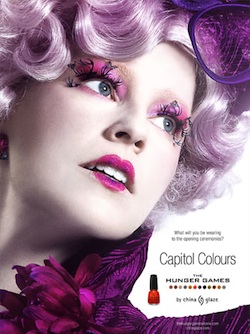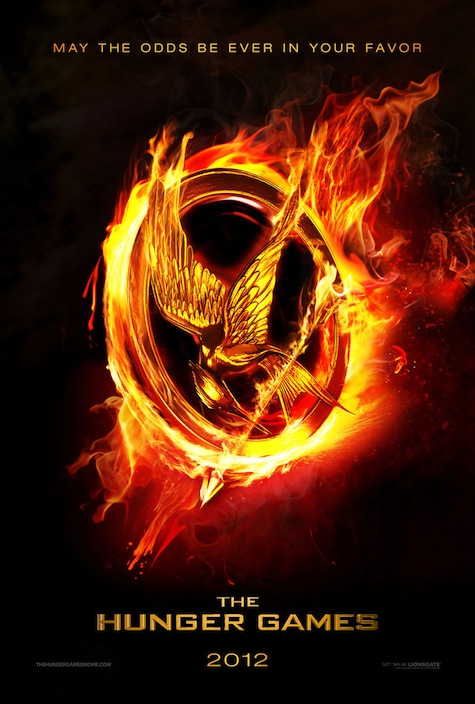Is it possible for the multi-million dollar marketing campaign for The Hunger Games movie to refrain from undermining the series arguments on violence, economic justice, and the media? Probably not, but I rather think Lion’s Gate is making a respectable effort.
So far, promotions for The Hunger Games have managed not to sink to such shameful depths as having the Lorax speak for SUVs. Rather, the bulk of the money is going towards plastering images of the burning mockingjay pin on as many flat (and digital) surfaces as possible. That’s about as true to the books as they can be while still getting the job done; if you squint hard enough, you can even see it as the rebellion within Panem spilling out into our own world.
Lion’s Gate is attempting to capitalize on fans’ desire to immerse themselves in the trappings of the text in a variety of ways. I have a particular fondness for Effie Trinket’s tumblr, complete with fashion tips and links to fan-made jewelry. There is an overall sense of play and experimentation, even if the studio’s obvious partnership with high-end designers like Rodarte is the kind of excess that Katniss despised, and several of the posts co-opt fan creativity rather than engaging with it. Most refreshing of all is the extent to which it shows that the campaign does not feel the need to choose between shunning stereotypically “feminine” topics and giving up on a national audience. Despite being poised to capture a much more diverse demographic than Twilight, advertisers aren’t worried that a plethora of posts on fashion and make-up on one small corner of their site might drive significant numbers away from the franchise altogether.
There is a lot missing from the social media campaign. Especially a way for fans to envision themselves as anyone but residents of an affluent district. The main Capitol site is designed to allow fans to sign up as citizens and interact with other fans in their assigned district, but accessing it is difficult and requires a better computer than the one I use—and my computer is neither old nor inexpensive. I believe this is a major misstep; it denies the teens that are most likely to identify with Katniss’ plight access to the world that Lion’s Gate has  created. It is a short-sighted decision that is even more out of sync with the themes of the book—and the reasons for its popularity—than “Effie’s” endorsement of a Panem inspired nail polish collection. Allowing for meaningful discussions about economic inequality and the media’s role as distraction for the masses isn’t just about being ideologically in line with the books, it’s also about recognizing what makes the stories so appealing and fostering the kind of connection to the narrative that drives word of mouth and social media advertising.
created. It is a short-sighted decision that is even more out of sync with the themes of the book—and the reasons for its popularity—than “Effie’s” endorsement of a Panem inspired nail polish collection. Allowing for meaningful discussions about economic inequality and the media’s role as distraction for the masses isn’t just about being ideologically in line with the books, it’s also about recognizing what makes the stories so appealing and fostering the kind of connection to the narrative that drives word of mouth and social media advertising.
What the websites are lacking, the trailers make up for and then some; they are deceptively simple and brilliant. What is particularly fascinating about them is what they don’t show, not what they do. For a science fiction movie with a high body count, there is very little blood or technology to be seen, especially to viewers new to the stories. Fans of the books will recognize the hovercraft for what it is, and know who Katniss just saluted and why, but the tv spots don’t take the time to spell any of this out. They just tell an abbreviated version of the first act; asking “what if?” and having faith that the question itself will be intriguing enough to get people into theaters.
By avoiding all but a few images of the games themselves, the trailers sidestep showing violence in all it’s dubious glory while encouraging movie-goers to come see kids kill each other. The ads are not sanitized, but they do follow the advertising norms for dramas more than those of genre films. They rely on gushing fans and general buzz to convey the rest of the pertinent details and warn off anyone who is unclear about the potential death toll, allowing the studio to reach out to viewers who may not have been lured in by a Harry Potter or Avengers style trailer. It’s a dangerous gamble that relies on the internet and the book’s popularity to pull it off, something that couldn’t have been done ten years ago.
What is in the trailers is a decent amount of fanservice. The glimpses of Rue, Cinna, and the expression on Senecra Crane’s face when the apple is shot are there to remind fans like me of why we love the story so much. Which inspires us to gush and link and like and share across whatever social media platforms we may use.
Lion’s Gate would do well to recognize their audience’s uneven access to the latest technology and show even more faith in fan creativity and opinions than they have. Issues of fairness aside, reaching out to the people who feel connected to the source material is how you build a fanbase that will carry you through multiple sequels. That doing so would bring them more in line with the themes of the books is merely a bonus.
That said, the studio has done an impressive job overall in marketing a film that is even now dismissed by some as being merely for teen girls and whose core demographic was just a few short years ago believed to be completely uninterested in science fiction in any form. The fact that it is culture’s perceptions and not teen girls that have changed doesn’t make the balance any less tricky to manage, or Lion’s Gate any less clever if they pull it off.
Jenny Kristine was a physics student and hovercraft builder in another life. Now she is the youth specialist for a small library in California and spends her work hours designing Hunger Games inspired scavenger hunts for middle school students and teaching patrons how to use the internet.











Many of the posters that I’ve seen have featured the slogan, “The whole world will be watching,” which I think is a very clever way to use the premise itself to convince potential viewers that they’ll be left out if they don’t go, preferably on opening night, of course.
A lot of the recent trailers have done this well, too. They introduce the set-up – Katniss volunteering gives me chills every time – and then close with the entrance into the arena. The 15-second countdown followed by the mad dash is haunting, thrilling, and a perfect encapsulation of the fans’ current emotional state. Yet another clever use of the premise to sell the experience of the movie.
I’m also always baffled when people ask if their teenage sons/nephews/etc will enjoy the books or if they’re just for girls. I can’t believe that people think an incredibly action-packed novel could only be for girls just because the narrator happens to be female. It’s sort of appalling.
My friend Carrie had some interesting thoughts on this—here’s the link to her post. Ultimately, I think more could have been done had they decided on the Capitol angle earlier in the marketing process, but I do like what they’ve done.
(And I love Capitol fashion. It’s so insane.)
@BridgetSmith
I think I expected to hear more of that than I have (I’ve hear similar questions often enough in the course of my career), but instead I just keep getting all kinds of teen boys coming up and asking for the books or telling me they can’t wait to see the movie.
I wonder if it’s just the demographics of where my library is at, or if it’s that I deal more often with the kids directly than with their parents. All the teens I know are aware of what the series is about – even the ones that haven’t read the book yet – but I just had to explain to a few of my co-workers yesterday what exactly happens in the games. Which was a rather amusing conversation. :p
@The Literary Onmivore
ooh, yes. Thanks for the link! I so wished they had done it that way. I’m not at all surprised that they didn’t though, bc I think the a lot of the big money players involved in the movie would have been very nervous to do so.